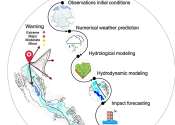Kenya floods prompt calls for warning systems
Kenya's worst flooding in decades highlights the urgent need for more robust mitigation efforts, including flood risk maps and early warning systems, say climate scientists.

Kenya's worst flooding in decades highlights the urgent need for more robust mitigation efforts, including flood risk maps and early warning systems, say climate scientists.
Environment
May 16, 2024
0
12

Porto Alegre, the Brazilian metropolis left submerged after torrential rains, had been lulled into a "false sense" of security by a vast but aging system of flood defenses, an urban drainage engineer told AFP.
Environment
May 16, 2024
0
1

Indonesian rescuers raced Wednesday to find dozens of people still unaccounted for after heavy rains caused flash floods and washed volcanic debris into residential areas over the weekend, sweeping away houses and leaving ...
Environment
May 15, 2024
0
9

A pair of University of Waterloo flood disaster experts have published an analysis on the federal government's national flood insurance program that finds the proposed plan can do more to make insurance abundant and affordable ...
Economics & Business
May 13, 2024
0
5

Climate change increases the frequency of extreme events such as flooding. This reinforces the need to develop methods for more precise and faster flood forecasting in order to better protect the population in the future.
Earth Sciences
May 13, 2024
0
65

The death toll from flash floods and cold lava flow from a volcano in western Indonesia over the weekend has risen to 43 with 15 more missing, officials said Monday.
Environment
May 13, 2024
0
1

As climate change continues to warm the planet, scientists expect natural hazards such as flooding to increase. Urban flooding can be caused by extreme precipitation events, storm surges, or high tides, with dangerous and ...
Earth Sciences
May 10, 2024
0
1

Floods caused by unusually heavy rains in eastern Congo caused hardship for more than 470,000 people, the World Food Program said Wednesday.
Environment
May 10, 2024
0
39

In media articles about unprecedented flooding, you'll often come across the statement that for every 1°C of warming, the atmosphere can hold about 7% more moisture.
Earth Sciences
May 9, 2024
0
45

Rivers, lakes, and reservoirs are like our planet's arteries, carrying life-sustaining water in interconnected networks. When Earth's water cycle runs too fast, flooding can result, threatening lives and property. That risk ...
Earth Sciences
May 8, 2024
0
6
A flood is an overflow or accumulation of an expanse of water that submerges land. In the sense of "flowing water", the word may also be applied to the inflow of the tide. Flooding may result from the volume of water within a body of water, such as a river or lake, which overflows or breaks levees, with the result that some of the water escapes its normal boundaries. While the size of a lake or other body of water will vary with seasonal changes in precipitation and snow melt, it is not a significant flood unless such escapes of water endanger land areas used by man like a village, city or other inhabited area.
Floods can also occur in rivers, when the strength of the river is so high it flows out of the river channel, particularly at bends or meanders and causes damage to homes and businesses along such rivers. While flood damage can be virtually eliminated by moving away from rivers and other bodies of water, since time out of mind, people have lived and worked by the water to seek sustenance and capitalize on the gains of cheap and easy travel and commerce by being near water. That humans continue to inhabit areas threatened by flood damage is evidence that the perceived value of living near the water exceeds the cost of repeated periodic flooding.
The word "flood" comes from the Old English flod, a word common to Germanic languages (compare German Flut, Dutch vloed from the same root as is seen in flow, float). The specific term "The Flood," capitalized, usually refers to the great Universal Deluge described in the Bible, in Genesis, and is treated at Deluge.
This text uses material from Wikipedia, licensed under CC BY-SA